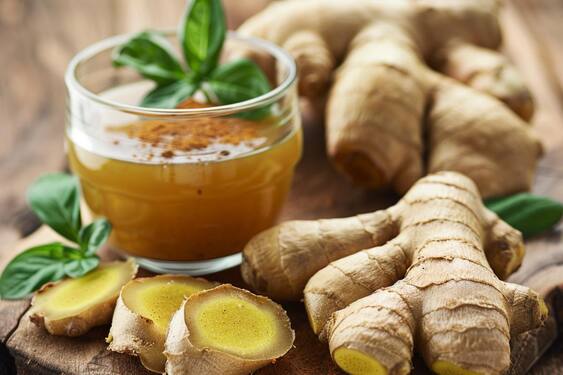- Home
- Healthy Diet
- How Ginger Can Boost Your Immunity During Cold Months
How Ginger Can Boost Your Immunity During Cold Months
Ginger is a winter superfood that boosts immunity, aids digestion, and keeps the body warm. Its anti-inflammatory properties relieve joint pain, while its ability to improve circulation helps with cold extremities. Ginger also supports respiratory health, clears congestion, and fights oxidative stress with its antioxidants. Regular consumption can aid weight management, improve heart health, and reduce winter ailments.

Harpreet Kour Updated: Oct 23, 2024 4:38 PM IST
Ginger is a powerful winter superfood known for its immunity-boosting, anti-inflammatory, and warming properties. It improves digestion, making it helpful for heavy winter meals, and aids in relieving nausea, bloating, and indigestion. Its thermogenic effect helps keep the body warm, while its ability to improve blood circulation prevents cold extremities. Ginger also combats respiratory issues, reducing coughs, congestion, and mucus buildup. Its antioxidants fight oxidative stress, protecting cells from damage and lowering the risk of chronic diseases. Consuming ginger regularly can support weight management, relieve joint and muscle pain, and promote heart health.
1. Boosts Immunity
Ginger strengthens the immune system, making it a natural shield against common winter illnesses such as colds, flu, and infections. Its anti-inflammatory and antioxidant properties help the body fight off pathogens more effectively.
2. Improves Digestion
During winters, heavy and rich foods are more common, which can slow down digestion. Ginger stimulates the digestive enzymes that break down food, easing bloating, gas, and indigestion. It also helps in relieving nausea and acid reflux, making it a great remedy for digestive discomforts.
3. Keeps the Body Warm
Ginger has thermogenic properties, which means it generates heat within the body. Consuming ginger in the winter keeps your body warm from the inside, helping you cope with cold weather. This is one reason ginger tea or ginger-infused water is often consumed during the cold season.
4. Anti-Inflammatory Effects
Ginger's active compound, gingerol, has powerful anti-inflammatory properties. This can be particularly helpful in winter for people who suffer from joint pain, arthritis, or other inflammatory conditions. Regular consumption of ginger can reduce pain and swelling in the joints.
5. Fights Respiratory Issues
Ginger acts as a natural expectorant, making it effective in treating winter respiratory issues such as coughs, colds, and bronchitis. It helps in clearing the airways, reducing mucus buildup, and soothing sore throats. Ginger's warming effect can also provide relief from congestion.
6. Boosts Circulation
In colder months, blood circulation tends to slow down, leading to cold hands and feet. Ginger can improve blood flow and circulation by widening the blood vessels. This helps in keeping the extremities warm and preventing frostbite or numbness.
7. Promotes Heart Health
Ginger supports heart health by reducing cholesterol levels and improving blood pressure. It prevents the formation of blood clots, lowering the risk of heart attacks and strokes, which can be more prevalent in winter due to poor circulation.
8. Relieves Sore Muscles
Winter activities or a sedentary lifestyle may cause muscle soreness or stiffness. Ginger's anti-inflammatory and muscle-relaxing properties help reduce muscle pain, making it a natural remedy for post-exercise muscle soreness or discomfort from inactivity.
9. Supports Weight Management
In winter, people often tend to overeat comfort foods, leading to weight gain. Ginger can help manage weight by boosting metabolism and fat-burning processes. It also helps in controlling hunger by keeping you fuller for longer, which reduces the urge to snack excessively.
10. Helps Fight Oxidative Stress
The cold winter months increase the production of free radicals due to the environment and stress, which can harm cells. The antioxidants in ginger combat oxidative stress, protecting cells from damage and lowering the risk of chronic diseases like cancer and heart disease.
How to Incorporate Ginger in Your Diet:
- Ginger Tea: Boil fresh ginger slices in water, and add honey and lemon for a soothing tea.
- Ginger and Honey: Mixing ginger juice with honey creates a powerful immune-boosting tonic.
- In Cooking: Add grated ginger to soups, stir-fries, or curries to enhance flavor and health benefits.
- Ginger Water: Drinking ginger-infused water first thing in the morning can stimulate digestion and metabolism.
Conclusion:
Eating ginger in winter offers an array of health benefits, from boosting immunity and digestion to keeping the body warm and reducing inflammation. Its potent medicinal properties make it a valuable addition to your winter diet, helping you stay healthy and resilient throughout the colder months.
